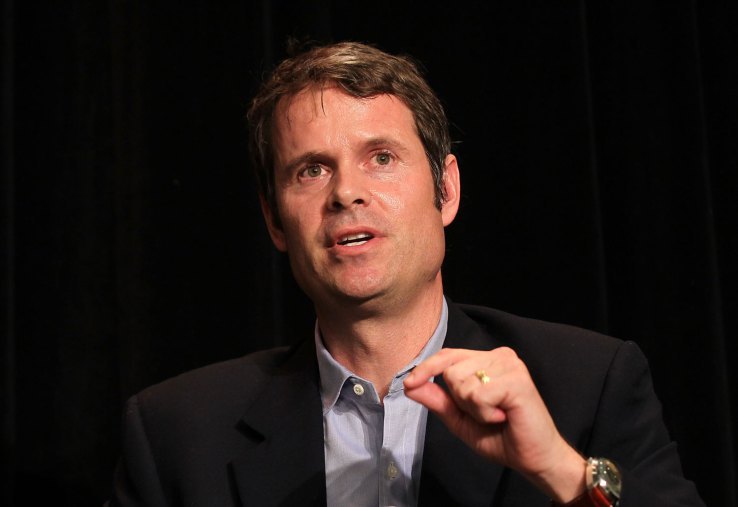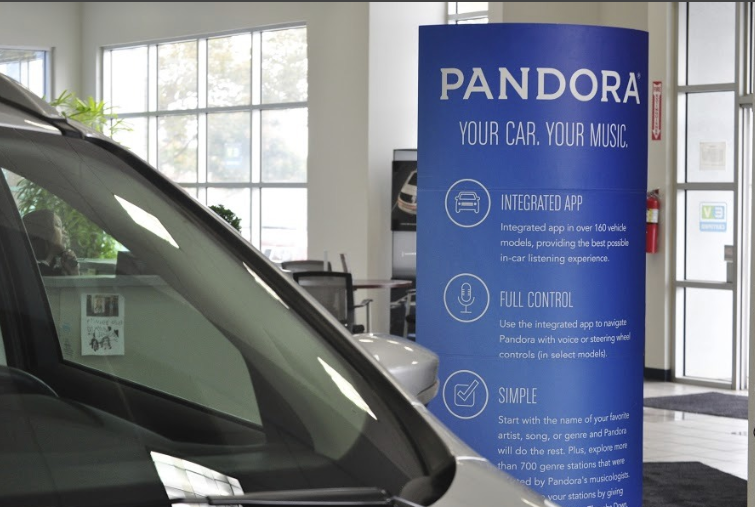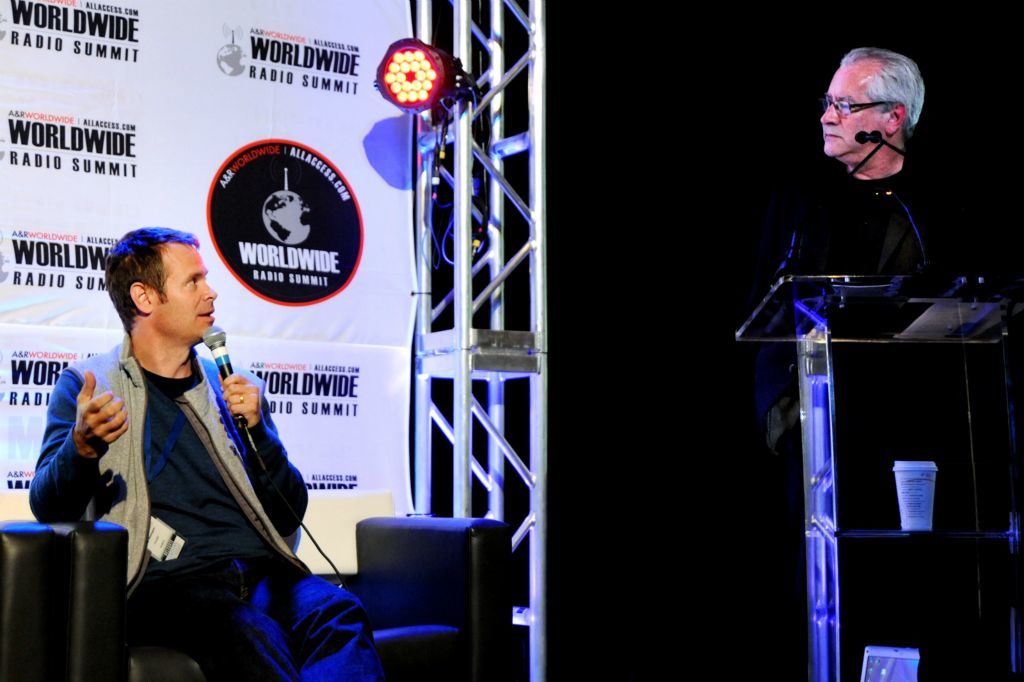 You’re reading today’s headline correctly. Pandora’s departed CEO, Tim Westergren, has been vilified for years in radio circles. (In fact, I’ve drawn a few of those circles myself.) But let’s not forget – Westergren is a true innovator, and deserves praise, primarily because of his impact on both the radio and music industries.
You’re reading today’s headline correctly. Pandora’s departed CEO, Tim Westergren, has been vilified for years in radio circles. (In fact, I’ve drawn a few of those circles myself.) But let’s not forget – Westergren is a true innovator, and deserves praise, primarily because of his impact on both the radio and music industries.
He was one of three founding members of Pandora back in 1999 – and arguably the face of the company. Unlike a lot of people who dream up the next great startup, Westergren’s music passion was the guiding force behind Pandora. It’s probably one of the reasons why he lasted 18 years in a highly competitive arena where they come and they go.
Part of the ire from broadcasters emanates from Westergren’s ongoing aggressiveness toward the radio business that dates back many years. In retrospect, Westergren might have done it differently. But by agitating radio executives, he served noticed that Pandora’s goal was to be more than a player in audio entertainment. His goal was to replace the radio medium as we knew it, and in the process, Pandora had success eroding radio listening and sales.
Last week before the long holiday weekend, Westergren’s time at the company he created came to an abrupt end. In the same announcement, he was relieved of his CEO duties and also departed his company’s board of directors. There’s been a lot of executive comings and goings this year – notably, Uber’s Travis Kalanick, Fox’s Roger Ailes, and American Apparel’s Dov Chareney – all of whom left their companies under pressure due to alleged untoward behavior.
Westergren’s departure from Pandora is nothing like that. With the infusion of capital from SiriusXM and the sale of Ticketfly, it’s obvious Pandora’s board seeks to go into a different direction, given the difficulties of navigating the financial maelstrom of streaming, made more difficult in recent years thanks to Spotify, Apple, Amazon, and others. And yet, you read a lot more about guys like Kalanick and Ailes because of the circumstances leading to their demise. Last week, Westergren did a slow fade.
My experience with Pandora goes back a lot of years. And back in 2009, Westergren visited Detroit on a tour of major markets to promote Pandora. He filled a small movie theater with passionate Pandora fan boys (and girls), eager to hear Westergren’s words. He didn’t disappoint, telling his compelling story about how as a music lover, his goal was to create an improved version of what we knew as “radio.” I blogged about Tim’s tour at that time, suggesting the radio industry should wake up to the threat from streaming in general, and Pandora specifically. Here’s a video snippet from that event I shot with my iPhone.
It was bold vision statements like this one that got under the skin of radio executives:
“We’re very ambitious about what we want to achieve with this company…we’re setting our sights on changing this thing called ‘radio’ completely. Our goal is to replace broadcast music radio with something a lot more personalized and inclusive than it’s ever been before.”
Radio got the message, and Westergren has been demonized by broadcasters ever since. But if you step back and think about what he accomplished with Pandora over the years, it’s an impressive list.
He created a category. Yes, streaming radio existed pre-Tim. But it never achieved mass appeal. Pandora’s “music genome” algorithm was unique, enabling music discovery via artists and songs. For many, Pandora became a gateway drug, introducing millions of consumers to streaming radio. And for many radio execs, Westergren delivered a wake-up call that streaming was going mainstream.
He believed in ubiquity. Westergren’s goal was to be everywhere. And Pandora was one of the first to make its way into the snarling mess of car radio dashboard touchscreens, working painstakingly with every OEM to maintain prime presence in cars. Whether it was on iPhones or refrigerators, a key to Pandora reaching scale was making its streaming music available anywhere and everywhere. In the process, he gave radio another lesson about the importance of being wherever his audience wanted to be.
 He was a brilliant marketer. You remember all those car ads featuring Pandora? Westergren’s company never paid a dime for that exposure. It was the automakers discovering that consumers loved Pandora, and how that P-icon could become a true new car selling point. Later, Pandora would launch an aggressive car showroom visibility campaign, something Pandora’s Geoff Snyder discussed at one of our DASH Conferences.
He was a brilliant marketer. You remember all those car ads featuring Pandora? Westergren’s company never paid a dime for that exposure. It was the automakers discovering that consumers loved Pandora, and how that P-icon could become a true new car selling point. Later, Pandora would launch an aggressive car showroom visibility campaign, something Pandora’s Geoff Snyder discussed at one of our DASH Conferences.
His music passion fueled his business model. Prior to founding Pandora, he worked as a record producer and composer for two decades. Yes, Pandora Media (as it was called back then) was all about music discovery, especially in the early days. Westergren’s love for music was his motivator – not so different from many radio professionals who were similarly inspired.
He’s a great storyteller. Yes, a part of that skill is hitched to his belief in Pandora as a company, a brand, and a platform. But if you’ve ever spoken to Westergren or heard him speak, his sincerity is impressive. Like a great PD who believes in his station, Westergren has charisma and charm that helped Pandora grow its streaming footprint.
He created a sales machine. Using (mostly) former radio people to staff its efforts, Pandora struggled with its music royalty fees, but clearly had a sales impact on the radio business. Talk to GMs and GSMs in larger markets, and most will admit that Pandora’s sales efforts were impressive and effective.
He truly has an appreciation for radio. Back in 2015 at the Worldwide Radio Summit, Westergren was on a panel moderated by my  brother Paul. He talked about how he and his kids listen to radio each day, and how he coveted radio’s elegant “one button solution.” While Westergren’s stated goal was to one-up radio, his strategy was always about trying to create a better version of a medium he respects.
brother Paul. He talked about how he and his kids listen to radio each day, and how he coveted radio’s elegant “one button solution.” While Westergren’s stated goal was to one-up radio, his strategy was always about trying to create a better version of a medium he respects.
Post-Westergren, Pandora will obviously be headed in a new direction. Perhaps one of his failings was not adopting a playlist model sooner, allowing newcomers like Spotify to gain the edge in both personalization and customization – values he emphasized back in that 2009 speech.
Becoming too attached to a model – something we know too well inside radio – is a common mistake made in a world of constant change and massive disruption. And in the scramble to recover, Pandora’s efforts to build out a concerts and events model with the acquisition of Ticketfly may have come too late in its cycle to have the desired impact.
So what’s next for Tim Westergren?
Only he knows what he wants to accomplish from here. He could start up a band or launch a record label. But I’m betting he’ll eventually move to reclaim his place on a larger stage.
Unlike other Internet startup founders, Westergren is a smart, likable, and talented visionary that will likely end up being an asset to a music/entertainment company looking to break through or move up a few levels.
For Pandora, it’s the end of an era. For Tim Westergren, it will be fascinating to see where he ends up next.
- What To Do If Your Radio Station Goes Through A Midlife Crisis - April 25, 2025
- A 2020 Lesson?It Could All Be Gone In A Flash - April 24, 2025
- How AI Can Give Radio Personalities More…PERSONALITY - April 23, 2025




Maybe the lesson for radio in all of this is finding a balance.
Dan, I think that’s part of it. The world is not binary – either/or – there is a middle ground. Thanks for the comment.
The whole premise of a programming algorithm was a fantasy used to sell an IPO.
Where music radio is vulnerable is the growing lack of local, live DJ talent and programming driven by local tastes in recorded and live music. Music is a living, breathing social experience and not merely background Muzak which, by the way was also programmed with an attempt at an algorithm along with focus groups. Streaming reminds me too much of FM radio in the 1950s.
Bob, clearly a definable difference for music radio is the impact of personality. Apple is trying to combat that, and Slacker has made valiant attempt at integrating DJs as well. Can streaming pure-plays make it on just their algorithms is a key question. Royalties are, too. Thanks for taking the time to comment.
He was never selling a product; he was selling a stock. Unfortunately, he wasn’t selling a viable stock (or product for that matter…..you know…..IF you want to actually MAKE money). When the stock price went too low, he was removed.
Actually, in the early years, he WAS selling a product/service. And it resonated. Perhaps when the financial stakes were raised, he desperately needed capital, and the company went public, it was as you described. As we’ve discussed in this blog and in other forums, no one’s making money with streaming – another reason why Amazon and Apple have an edge as they have other businesses that are obviously immensely profitable. Thanks, Mike.
No question, he missed the playlist opportunity and was left with a product that those that didn’t could replicate.
But wait, there’s more…
No one in the streaming business ever made a dime of operating profit and that limits all of their ability to invest in the kind of product development that will allow them to keep up and grow. Maybe Sirius/XM has a deal done with the music industry that will change that.
Pandora did a great job of developing a product/audience and a really impressive job of monetizing it if you look at value per listener compared with other media. When you can become something close to a national 10 share radio station, convert ears to revenue better than your biggest competitor (radio) but can’t make money, something else is wrong.
I think Tim’s fate was attributable to the lack of a “willing seller” of streaming rights more than any other factor. Hopefully his many talents will be applied to something with a less Sysophisian set of built in headwinds.
Bob, I think you ended up where I did on Westergren. In an arena where it’s pretty impossible to win in the conventional sense (ie. profitability), he did some amazing things. Others will criticize that view, and I get that. But when you pull back and look at the things he did well – some of which revolutionized the space – it’s impressive. And whether anyone admits it or not, radio had to step up in order to compete. Thanks for the solid observations.
He may have been the first to take streaming to the masses, but calling him genius is a stretch. He had an idea but he failed at it. He had 18 years to turn a profit and didn’t. The company when public and the stock has gone from $39 to $9 in the last 3 years.
The SXM investment won’t save Pandora. He should have sold to SXM
Once iHeart and Cumulus correct their debt either through bankruptcy or other means, they will be better companies.
Once CBS becomes ETM, they will have joined two top notch brodcadting companies.
Westergren WAS always selling a stock price, as stated above. Regardless for his love of music, he wasn’t a programmer. He had 18 years to create content and he ran a jukebox for millennials.
He was never able to retain advertisers like radio had been able to for decades.
Adapt or die. He had 18 years to adapt and Pandora has been essentially the same while others improved the streaming experience.
If he got into streaming movies, videos, content development, that’s a move in creativity.
What he’s done for Pandora is not genius at $8.88 stock price.
John, I respect your point of view. I believe that Westergren was hopeful to get royalty relief and it never came to pass. I realize you cannot build a business on a hope strategy. The impact with advertisers is being felt, and Pandora has been a formidable competitor. No argument about the lack of profits – it’s a flaw and it cost him his job. But by challenging radio, I would argue it has made our medium better – more focused on distribution, the car, and other areas where Pandora was making progress. Again, I appreciate you taking the time to read our blog and to weigh in. Thanks.